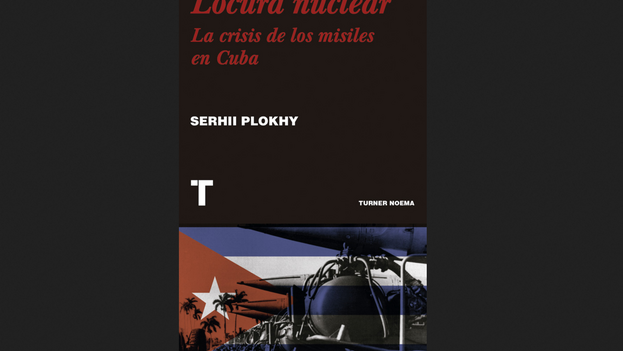
![]() 14ymedio, Madrid, October 11, 2022 — Turner, a Spanish-Mexican publishing house, has just released the first Spanish-language edition of “Nuclear Folly: The Cuban Missile Crisis” by the Ukrainian historian Sarhii Plokhy, director of the Harvard Ukrainian Research Institute. It was described by The Wall Street Journal as “one of the most important books ever written on the missile crisis and international relations of the 20th century.”
14ymedio, Madrid, October 11, 2022 — Turner, a Spanish-Mexican publishing house, has just released the first Spanish-language edition of “Nuclear Folly: The Cuban Missile Crisis” by the Ukrainian historian Sarhii Plokhy, director of the Harvard Ukrainian Research Institute. It was described by The Wall Street Journal as “one of the most important books ever written on the missile crisis and international relations of the 20th century.”
According to a review published on Tuesday in the Spanish newspaper El Confidencial, the book contains many revelations, two of which stand out. One involves the extremely dangerous ways John Kennedy and Nikita Khrushchev handled the situation, threatening each other and exchanging reckless and confusing words. In another, the author reveals that “Castro really wanted a nuclear attack on the United States to put an end to the empire once and for all, even if that meant the end of Cuba.”
“Khrushchev was not going to start a nuclear war but what he had in mind was a risky, extremely dangerous nuclear operation,” writes Plokhy, explaining that the Soviets decided to place nuclear missiles in Cuba to avoid a repeat of the 1961 Bay of Pigs invasion. Moscow calculated that missiles so close to, and aimed directly at, the continental United States would have a deterrent effect on Washington.
The review likens the book’s tone to that of a thriller, especially in describing how the weapons were hidden in Soviet boats, shipped to Cuba and assembled on the island by workers who were unaccustomed to the rigors of the stifling Caribbean heat or the endemic diseases to which they succumbed. Though we know how the story ends, the tone is still one of terror as messages between the Soviet and American presidential teams cross paths, leading to the brink of apocalypse.
“They made almost every conceivable mistake and took every conceivable step,” writes the author. Though war was ultimately averted, the loser — in moral terms at least— was Khrushchev. He had initiated a reckless operation that he had to call off. Nevertheless, as Plokhy notes, “The truth is that he also achieved some of his objectives: Cuba was not invaded and remained communist despite the fact that Castro would always angrily regret that he had been sidelined in all the negotiations.”
The text is “a masterpiece of historical reconstruction, ably explaining how chance, miscommunication, stubbornness and human error conspired to lead us to the brink of catastrophe”, the book jacket states. The author brings the subject into the present, reminding readers that Putin is now in command of a nuclear arsenal whose possible use has become a pressing issue in recent days.
“Read this splendid book to see what happened and to understand how much luck it took to prevent a much worse outcome. Let’s hope we are so lucky today,” it concludes.
____________
COLLABORATE WITH OUR WORK: The 14ymedio team is committed to practicing serious journalism that reflects Cuba’s reality in all its depth. Thank you for joining us on this long journey. We invite you to continue supporting us by becoming a member of 14ymedio now. Together we can continue transforming journalism in Cuba.
